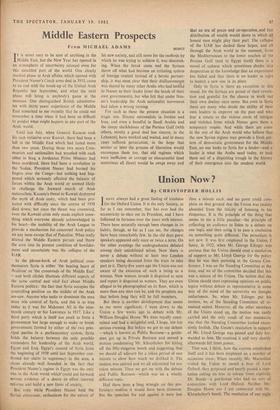Middle Eastern Prospects
From MICHAEL ADAMS
BEIRUT
IT is never easy to be sure of anything in the iddle East, but the New Year has opened in an atmosphere of uncertainty unusual even for this unsettled part of the world. One clearly marked phase in Arab affairs, which opened with President Nasser's Czech arms deal in 1955, came to an end with the break-up of the United Arab Republic last September, and what the next phase will bring is anybody's guess at the moment. One distinguished British administra- tor with thirty years' experience of the Middle East remarked to me recently that he could not remember a time when it had been so difficult to predict what might happen in any part of the Arab world.
Until last July, when General Kassem took his rash initiative over Kuwait, there had been a lull in the Middle East which had lasted more than two years. During those two years Com- munists and nationalists had wrestled with each other in Iraq, a Jordanian Prime Minister had been murdered, there had been a revolution in the 'Sudan, President Nasser had burned his fingers over the Congo—but nothing had hap- pened which seriously affected the balance of forces within the Arab world or seemed likely to challenge the forward march of Arab nationalism. Kassem's threat to Kuwait destroyed the myth of Arab unity, which had been pro- tected with difficulty since the storms of 1958 died down; but since the threat was countered, even the Kuwaiti crisis only made explicit some- thing which everyone already acknowledged in his heart—the inability of the Arab League to provide a mechanism for concerted Arab policy on any issue except that of Palestine. What really altered the Middle Eastern picture and threw the area into its present condition of bewilder- ment and uncertainty was the collapse of the UAR.
In the phrase-book of Arab political com- mentators Syria is either 'the beating heart of Arabism' or 'the crossroads of the Middle East' —and both cliches illustrate different aspects of the same central and vital fact about Middle Eastern politics: the fact that Syria occupies the controlling position on the middle of the Arab see-saw. Anyone 'who seeks to dominate the area must win control of Syria, and this is as true today as it was for Mahomet Ali in the nine- teenth century or for Lawrence in 1917. Like a third party which is itself too small to form a government but large enough to make or break governments formed by either of the two, prin- cipal parties in a parliamentary system, Syria holds the balance between the only possible contenders for leadership of the Arab world, Egypt and Iraq. Egypt's control of Syria from the beginning of 1958 until last September con- firmed her claim to supremacy in the area, a claim already well founded in the fact that President Nasser's regime in Egypt was the only one in the Arab world which'could put forward serious evidence of a desire to effect internal reforms and build a new form of society.
But even while President Nasser held the Syrian crossroads, enthusiasm for the nature of his new society, and still more for the methods by which he was trying to achieve it, was diminish- ing. When the break came and the Syrians threw off what had become an irritating system of foreign control instead of a heroic partner- ship, it was soon clear that their disillusionment was shared by many other Arabs who had looked to Nasser as their leader (over the heads of their own governments), but who felt that under Nas- ser's leadership the Arab nationalist movement had taken a wrong turning.
For such as these the present situation is a tragic one. Sincere nationalists in Jordan and Iraq, and even a handful in Saudi Arabia and the sleepy sheikhdoms of the Persian Gulf (with others, mostly a good deal less sincere, in the Lebanon), have worked and waited, and in many cases suffered persecution, in the hope that sooner or later the process of liberation would encompass them too, that old regimes which were inefficient or corrupt or obscurantist (and sometimes all three) would be swept away and that an era of peace and co-operation and fair distribution of wealth would dawn in which all honest men might play their part. The collapse of the UAR has dashed these hopes, and all through the Arab world at the moment, from the Mediterranean to the lower reaches of the Persian Gulf (and in Egypt itself) there is a mood of sadness which sometimes shades into desperation at the knowledge that an experiment has failed and that there is no leader in sight to launch a new one in its place.
Only in Syria is there an exception to this mood, for the Syrians are proud of their revolu- tion and grateful for the chance to work out their own destiny once more. But even in Syria there are many who doubt the ability of their own leaders to improve on the past and who fear a return to the vicious circle of intrigue and violence from which Nasser gave them a temporary respite. And while there are some in the rest of the Arab world who believe that the new Syrian regime may provide a fresh pat- tern of democratic government for the Middle East, no one looks to Syria for a leader—and a leader is what the Arabs need today, to lead them out of a dispiriting trough in the history of their emergence into the modern world.


































 Previous page
Previous page